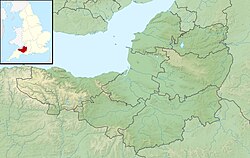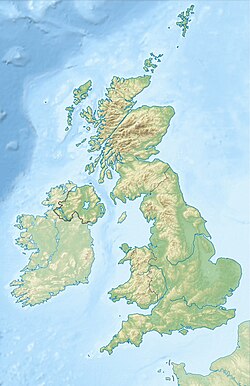RM Norton Manor
| Norton Manor Camp | |||||||
|---|---|---|---|---|---|---|---|
| Near Norton Fitzwarren, Somerset in England | |||||||
 Entrance to Norton Manor Camp | |||||||
| Coordinates | 51°02′13″N 003°09′17″W / 51.03694°N 3.15472°W | ||||||
| Type | Royal Marines Base | ||||||
| Area | 66 hectares[1] | ||||||
| Site information | |||||||
| Owner | Ministry of Defence | ||||||
| Operator | |||||||
| Controlled by | |||||||
| Condition | Operational | ||||||
| Website | RM Norton Manor - Royal Navy | ||||||
| Site history | |||||||
| Built | 1940 | ||||||
| Built for | War Office | ||||||
| Built by | Royal Army Service Corps/US Army | ||||||
| In use | 1940 – present | ||||||
| Garrison information | |||||||
| Occupants | 40 Commando Royal Marines | ||||||
| Airfield information | |||||||
| Elevation | 33 metres (108 ft) AMSL | ||||||
| |||||||
Norton Manor Camp, or RM Norton Manor, is a Royal Marines base located near Norton Fitzwarren, 2 miles (3.2 km) north west of Taunton, Somerset, in England. It is home to 40 Commando.
In 2016, the government announced that Norton Manor Camp would be closed by 2028.[2][3] However, this decision was reversed in February 2019 following a successful local campaign.
History
[edit]Norton Camp
[edit]Norton Camp is a large hillfort, and shows evidence of occupation from neolithic times. Thought to have been on the boundary between two tribes, it is one of the earliest sites of permanent human occupation within the Taunton area. It was later occupied through the Bronze Age to the Roman occupation of the local area.[4]
By the early 18th century, the land around the hill was owned by Norton Manor. Silk mills had occupied the Taunton side of the brook that marked the parish boundary, while in the early 20th century the Norton side had been developed as parkland, or left as farmland.[4]
Second World War
[edit]Logistics depot
[edit]With the outbreak of the Second World War, the British Army were in desperate need of modern logistics facilities: Norton Fitzwarren is on the former Bristol and Exeter Railway ('B&ER') mainline, which was operated by the B&ER until 1 January 1876 when it was amalgamated with the Great Western Railway.[5]
The station became an important junction station, with access within an hour to:
- North: Bristol, Cardiff and Gloucester, then onwards to the industrial Midlands
- South: Exeter, and hence to HMNB Devonport
- East: Yeovil and the LSWR mainline, onwards to all of the major south coast ports, including Portsmouth and Southampton
- West: branch lines to Minehead and Barnstaple
Resultantly, the station for a relatively small village was quite extensive, having two island platforms creating four platforms. Thanks also to the extensive local silk mills, there were also extensive existing freight handling facilities within the Fairwater Yard, a large regional freight yard located south of the mainline.[6]
US Army G50 depot
[edit]Commissioned by the Royal Army Service Corps after completion as a logistics and distribution depot for them in early 1941, the United States Army took over Norton Manor Camp as part of Operation Bolero in 1942, one of their 18 supplies depots within the United Kingdom. Redesignated Quartermaster General Depot G-50, they equipped it with extensive railway sidings to the north-east of the railway station.[6] Part of the reasoning behind the choice of the depot was that it was one of five within the 18 designated as a US Army Medical Corps supplies depot. Medical supplies were allocated 110,680 square feet (10,283 m2) of under cover storage, and a further 25,000 square feet (2,300 m2) outside.[7] The US Army also locally developed the 67th General Hospital at Musgrove Park. Both facilities under the control of the US Army Medical Corps came into operation on 1 September 1942.[8][9]
Prisoner of War Camp: No. 665 Cross Keys
[edit]
In 1941, the British Army established a 300-person Prisoner of War (POW) camp on a northern part of the site at Burnshill, designated POW Camp No.665 Cross Keys.[10] Initially housing Italian Army prisoners from the Western Desert Campaign, it later housed German prisoners post the Battle of Normandy.[11]
Post War Ordnance Depot (1945–1978)
[edit]After the end of hostilities, the US Army handed the base back to the British Army. Re-designated No.3 Supply Reserve Depot, the Army equipped it with a civil workforce, who were charged with sourcing, buying and then packing various supplies packs, mainly ration food but also other supplies, for British Army units stationed around the world.[12]

Despite extensive lobbying by local Member of Parliament Edward du Cann on the Under-Secretary of State for Defence for the Army Merlyn Rees, the decision was made to close the depot in 1966.[13] With the branch-line to Barnstaple also closing under the Beeching cuts, the station at Norton Fitzwarren was closed by British Railways in October 1961.[14][15]
British Army training base (1950–1983)
[edit]The northern part of the camp was separated from the ordnance depot after the war and took the name Norton Manor Camp. From 1950 until 1961, it was home to 8 (Basic Trades) Training Battalion of the Royal Electrical and Mechanical Engineers (REME).[16]
From the early 1960s to the late 1970s, the base was the main camp of the Junior Leaders Regiment of the Royal Army Service Corps, later Royal Corps of Transport from 1965.[16]
Royal Marines operational base (1983–present)
[edit]In 1983, 40 Royal Marines Commando moved from Seaton Barracks, Plymouth, where they had been based since their return from Singapore in 1971, into Norton Manor Camp, which became the base for an operational unit for the first time in its history.[17]
Redevelopment
[edit]The western part of the site close to the railway was sold off to either commercial developers (including a new production site for Taunton Blackthorn Cider), re-utilised as a trading estate, or sold onwards to Taunton Deane Borough Council for redevelopment as housing.[6]
By the early 21st century, agreement was reached to redevelop the site again. Only four of the original Army supply depot warehouses now survive, with the rest demolished to build a new trading estate, 500 new homes, and a new road system to bypass Norton Fitzwarren.[6]
Planned closure
[edit]In 2016, the government announced that Norton Manor Camp would be closed by 2028.[2][3]
However, following a successful campaign by Taunton Deane MP Rebecca Pow and Liberal Democrat parliamentary candidate Gideon Amos, it was announced in February 2019 that the decision to close Norton Manor Camp had been reversed and the camp would remain operational indefinitely.[18]
Based units
[edit]Notable units based at Norton Manor Camp.
Royal Navy
[edit]Royal Marines (UK Commando Force)
Role and operations
[edit]
With easy access to the ideal combined training territory contained within the Blackdown and Quantock Hills, as well as the Somerset Levels, from 1983 the camp has been home to 40 Commando, Royal Marines.[6]
The base is fully supporting of the Marines and their families, providing a range of accommodation suites and houses; a medical centre; dental surgery; education centre; library; internet suite; RI shop; Naafi/Spar shop and families centre.[19]
Refreshed and in part rebuilt, the camp includes extensive fitness and gymnasium facilities, with: a large fully equipped gymnasium; separate indoor arena for football and basketball; indoor swimming pool and squash and tennis courts. Outside is a climbing tower; an all-weather pitch; individual pitches for both football and rugby; and a camp perimeter circuit track.[19]
Shoulder to Shoulder
[edit]In 2010, the Somerset County Gazette launched the "Shoulder to Shoulder" campaign, allowing local people to directly support 40 Commando. The campaign received backing from the UK Government, and from Foreign Office Minister Alistair Burt and former Taunton Deane MP and fellow Foreign Office Minister Jeremy Browne.[20]
References
[edit]- ^ "Defence Estates Development Plan (DEDP) 2009 – Annex A" (PDF). GOV.UK. Ministry of Defence. 3 July 2009. p. 39. Retrieved 28 November 2018.
- ^ a b "40 Commando Royal Marines exit 'will have a massive effect'". BBC News. Retrieved 9 November 2016.
- ^ a b Ovens, Ruth (7 November 2016). "Norton Manor Camp near Taunton to close along with 6 other South West sites says Defence Secretary". Somerset Live. Retrieved 9 November 2016.[permanent dead link]
- ^ a b "Taunton Archaeological Assessment" (PDF). English Heritage/Somerset County Council. Archived from the original on 15 September 2016. Retrieved 15 August 2012.
{{cite web}}: CS1 maint: bot: original URL status unknown (link) - ^ MacDermot, E T (1931). History of the Great Western Railway. Vol. 2 (1863-1921) (1 ed.). London: Great Western Railway.
- ^ a b c d e "The New Somerset Heritage Centre and its Site History". Somerset County Council. 23 April 2005. Retrieved 15 August 2012.
- ^ US Army Medical Department. "CHAPTER IX Europe: Preinvasion Buildup in the United Kingdom". Retrieved 15 August 2012.
- ^ "History in Brief". Musgrove Park Hospital. Retrieved 5 July 2009.
- ^ Wakefield, Ken (1994). Operation Bolero: The Americans in Bristol and the West Country 1942-45. Crecy Books. p. 101. ISBN 0-947554-51-3.
- ^ "Prisoner of War Camps Report for web" (PDF). English Heritage. Retrieved 15 August 2012.
- ^ Powell-Thomas, Andrew (2019). 50 Gems of Somerset. Amberley Publishing. ISBN 978-1445685519.
- ^ "Second World War army supply depot, East of Norton Fitzwarren". Somerset West Heritage Trust. Retrieved 17 June 2021.
- ^ "R.A.O.C DEPOT, NORTON FITZWARREN (CLOSURE)". Parliamentary Debates (Hansard). 9 March 1966. Retrieved 15 August 2012.
- ^ Closing of Stations The Railway Magazine issue 728 December 1961 page 885
- ^ Oakley, Mike (2006). Somerset Railway Stations. Bristol: Redcliffe Press. ISBN 1-904537-54-5.
- ^ a b "Park and Second World War camp, Norton Manor, Norton Fitzwarren". Somerset West Heritage Trust. Retrieved 17 June 2021.
- ^ "40 Commando". British Army units 1945 On. Retrieved 17 June 2021.
- ^ Jones, Paul (28 February 2019). "Closure of Norton Manor Camp near Taunton reversed". Somerset County Gazette.
- ^ a b "Norton Manor Camp". Royal Navy. Archived from the original on 15 April 2012. Retrieved 15 August 2012.
- ^ "Shoulder to Shoulder backed by Minister". Somerset County Gazette. 5 November 2010. Retrieved 15 August 2012.



